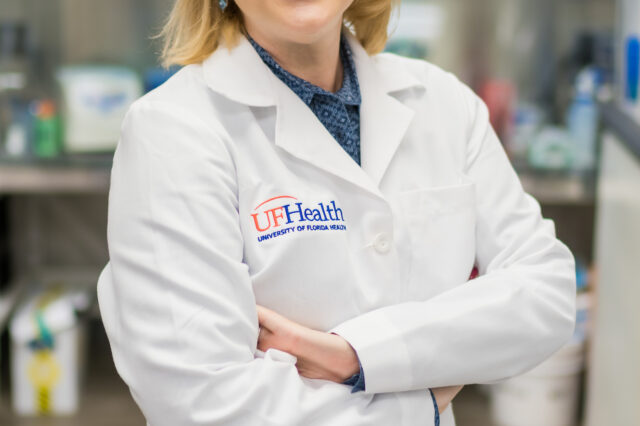UF Health chief epidemiologist debunks common COVID-19 vaccine myths

Here is a link to the UF Health COVID-19 website, for more information about the vaccine: https://coronavirus.ufhealth.org/vaccinations/
As the new vaccines developed to combat COVID-19 begin to flow into communities around the country, myths and misinformation are coursing through the general population as well.
In an effort to blunt some of these misperceptions, Nicole M. Iovine, M.D., Ph.D., chief epidemiology officer at University of Florida Health Shands Hospital, addresses some of the more common myths that are percolating on social media and other places.
Myth: The COVID-19 vaccines will make a person more susceptible to other diseases.
Answer: Our immune systems are wonderfully robust, and are actually responding to potential disease-causing organisms all the time. So, our immune systems are more than capable of responding to this vaccine while continuing to protect us from all the other potential infections we constantly encounter.
Myth: Mass vaccinations will promptly end the COVID-19 pandemic.
Answer: The vaccine is our best tool yet for controlling the COVID-19 pandemic. However, it is important to remember that the vaccine will not end the pandemic on its own. That is because, like all vaccines, it cannot prevent 100% of all infections in vaccinated persons. Although the studies indicate efficacy rates of 90% or more, a small percentage of people will still develop COVID. Also, at this point we do not know if vaccinated people can still transmit the infection to others. We anticipate that we will learn more about this as time passes. Lastly, the vaccine is currently authorized only for people ages 16 and over, so the younger population cannot be vaccinated at this time. As studies in younger populations continue, we hope that more children will be able to be vaccinated.
Myth: The technology that makes the vaccines work will interfere with a person’s DNA.
Answer: All living things make messenger riobonucleic acid, or mRNA, that provides the instructions for our cells to make proteins. mRNA has no ability to integrate or otherwise become part of a person’s DNA. There is nothing special about the mRNA in the COVID-19 vaccine that would allow it to interfere with the DNA in our cells or persist in our bodies.
Myth: If everyone around me is immune due to vaccination or a prior COVID-19 case, I don’t need a vaccine.
Answer: There are several reasons why this is not true. First, we do not know if a vaccinated person can still transmit the virus to another person. Second, this is a two-vaccine series that takes several weeks after the second dose to generate a full immune response. That means a vaccinated person could still be susceptible to infection and possibly transmit COVID-19 while the immune response develops. Third, like all vaccines, it is not able to prevent COVID-19 infection in 100% of vaccinated people. And while we hope that immunity is long-lasting, it isn’t known if or when a vaccinated person may again become susceptible to infection.
Myth: The vaccines were developed so quickly that its safety and efficacy are questionable.
Answer: Tremendous support and resources have been dedicated to the COVID-19 vaccine effort. That is why it has been able to come to fruition so quickly. It is important to remember that all of the necessary efficacy and safety studies have been completed, just as if the vaccines had taken years to produce. All of the regulatory oversight on vaccine production has also remained unchanged.
Media contact: Ken Garcia at kdgarcia@ufl.edu or 352-273-9799.
About the author
